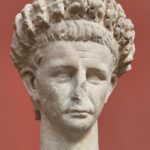Seneca the Younger, a Roman philosopher and writer from the 1st century CE, wrote a satire about Emperor Claudius in revenge for his exile to Corsica in 41 CE. He titled his work: “The Pumpkinification of (the Divine) Claudius” (Apocolocyntosis divi Claudii). Naturally, he wrote his work during the reign of Nero, after Claudius was murdered in 54 CE.
The plot of the satire1 tells about an attempt to “screw” the deceased Emperor Claudius in the company of the gods. Seneca presents the death of the ruler as follows:
The last words he was heard to speak in this world were these. When he had made a great noise with that end of him which talked easiest, he cried out, “Oh dear, oh dear! I think I have made a mess of myself”.
Claudius, after his death, limps to Mount Olympus to join the gods. At first, he is greeted by Hercules, whom he manages to convince him to allow him to see the gods. The first speech in the “divine” senate is made by Octavian Augustus (Seneca suggests here that the deified emperors had the lowest status among the gods), which indicates the cruelty of Claudius and the killing of numerous senators on his orders. August was supposed to say:
This man, my lords, who looks as though he could not hurt a fly, used to chop off heads as easily as a dog sits down.
The speech of the first emperor convinces other gods and Claudius is sentenced to punishment – for all eternity he is to play dice in a bottomless cup (it is a reference to his love of gambling). Claudius will have to pick up cubes from the floor each time. He is accompanied by Mercury on his way to Hades; on the way, Claudius has a chance to see his funeral.
In Hades, the emperor meets the spirits of his victims and plays dice. Suddenly, however, Emperor Caligula appears, announcing that Claudius is his slave and will work endlessly in his legal office in Hell.
As you can see, if Seneca really was the author of the work, the Stoic philosopher had a lot of venom toward the former emperor. It is worth mentioning that the reason why Seneca was sent to Corsica for eight years was to accuse him of adultery with Julia Livilla, Caligula’s sister. The main enemy of Livilla and Seneca was Messalina, the wife of Claudius.







